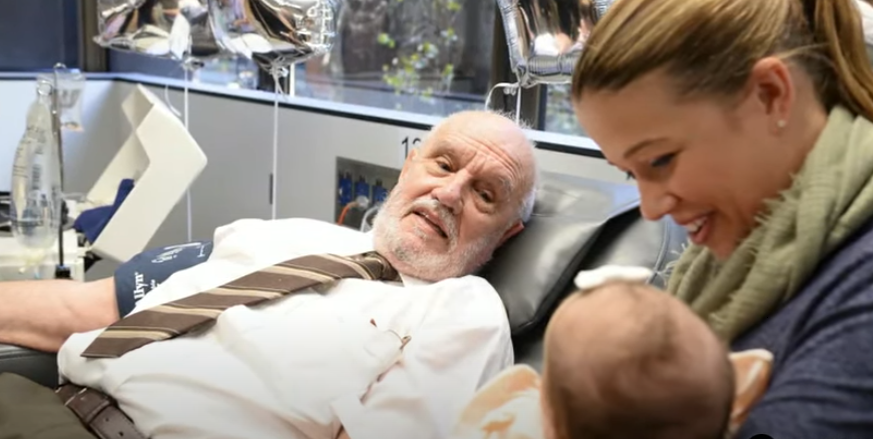
James Harrison, an Australian blood donor whose rare plasma helped save over two million babies, has passed away at the age of 88.
Known as the “Man with the Golden Arm,” Harrison possessed a rare antibody called Anti-D, which made his plasma invaluable in preventing severe complications in newborns. According to Australian Red Cross Lifeblood, he donated blood more than 1,100 times throughout his lifetime.
Harrison passed away in his sleep on February 17 at a nursing home north of Sydney. His commitment to blood donation stemmed from his own experience—after undergoing lung surgery at 14, he required multiple transfusions, inspiring him to give back.
He began donating plasma at 18 and continued every two weeks until he reached 81, the maximum donation age in Australia.
Lifeblood Chief Executive Officer Stephen Cornelissen praised Harrison’s extraordinary dedication and lifesaving contributions.
Lifeblood CEO Stephen Cornelissen described Harrison as a “remarkable, stoically kind, and generous person” who dedicated his life to helping others. “James extended his arm to help others and babies he would never know a remarkable 1,173 times and expected nothing in return,” he said.
Harrison’s daughter, Tracey Mellowship, reflected on his profound impact, calling him “a humanitarian at heart.” She shared that she was an Anti-D recipient herself and credited her father’s donations for making their family possible.
“As an Anti-D recipient myself, he has left behind a family that may not have existed without his precious donations,” she said. “He was also very proud to have saved so many lives, without any cost or pain. It made him happy to hear about the many families like ours, who existed because of his kindness.”
Anti-D is used to create a medication given to pregnant women at risk of rhesus disease, a condition that occurs when a mother’s RhD-negative blood reacts against her unborn baby’s RhD-positive blood cells, potentially leading to serious complications.
If a mother becomes sensitized to rhesus-positive blood—often during a previous pregnancy with an RhD-positive baby—her immune system may produce antibodies that attack the baby’s “foreign” blood cells. In severe cases, this can lead to brain damage or even death.
Anti-D, made using Harrison’s rare antibodies, prevents rhesus-negative mothers from developing these harmful antibodies, effectively protecting their unborn babies.
Australian officials hailed the discovery of Harrison’s antibodies as a medical breakthrough.
“In Australia, up until about 1967, there were literally thousands of babies dying each year, doctors didn’t know why, and it was awful. Women were having numerous miscarriages and babies were being born with brain damage,” Jemma Falkenmire of the Australian Red Cross Blood Service told CNN in 2015.
“Australia was one of the first countries to discover a blood donor with this antibody, so it was quite revolutionary at the time.”
Recognized as a national hero, Harrison received numerous accolades for his selfless contributions, including the prestigious Medal of the Order of Australia, one of the country’s highest honors.


